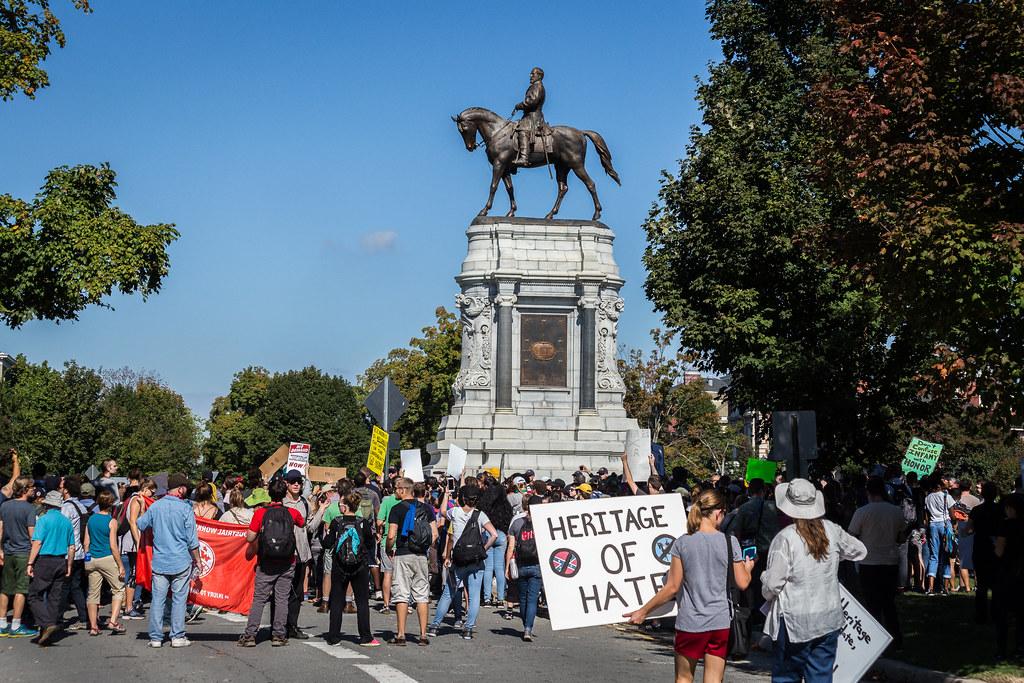I am a Southerner by birth. When I was a child, my family moved north – to Ohio, to be precise, so not exactly Yankee country, but certainly a state that was instrumental in winning the war for the US against the slaver states. I can say “slaver states” now, but for many years I bought into the idea that the south’s cause was somehow legitimate, that it had really been only about state’s rights, and that slavery, a despicable practice, was just an unfortunate add-on, and would have ended anyway. I thought of myself as a proud southerner, transported to foreign ground.
(I should mention that this was not the way my family thought. I was just being pig-headed. And racist).
This notion that southern heritage equals confederate identity, and that confederate identity was not really about owning, torturing, and raping people, was unfortunately, coddled and fostered by my many years in higher education. I attended two different Catholic universities known for their “conservative values,” and at both some of my favorite professors were confederate sympathizers. For this reason, the deprogramming was long in coming. If I had gone to secular universities, or to any of the fine progressive Catholic universities in this nation, I would have gotten over my delusions far more rapidly. I am grateful that I can see clearly now, but also feel it my duty to do penance for advancing false and abusive narratives. It is my duty to speak up.
What changed my mind? Social media helped. I was able to hear Black voices speak out about what the confederate battle flag spells out for them. I realized that any good intentions I had in trying to pretend that confederate heritage isn’t exactly as evil as Nazi heritage – and as a Jewish woman, I have always been vehemently anti-Nazi – were eclipsed by reality. Facts, as they say, did not care about my feelings about the south.
Talking to other confederate sympathizers helped, too, in a negative way. I remember one conversation in which I was busily prettying-up the narrative and expounding on state’s rights, and then added something nice and mandatory about how awful slavery was. And the person I was talking to – educated at yet another Catholic college known for conservative values – disagreed. He didn’t think slavery was all that bad at all. I had a sudden moment of seeing my own face in a mirror, and not liking it. Was this who I wanted to be? Whom I wanted to align with?
Education helped. Once I was an educator myself I did not think that my obligation to keep learning was over. On the contrary, every semester I prepared for my courses by researching more, especially about the history of the texts I taught. My long journey from conservative to progressive certainly had its threshold on the classics, which tend to liberate one from narrow and prejudicial thinking, when read properly – but most of it was carried out while I was teaching at the self-same school where I had, years ago, had my white supremacist biases confirmed. I had to “unlearn what I had learned,” as Yoda might say, and learn anew how to think accurately about history, identity, sexuality, and race. This did not exactly endear me to the administration.
Sometimes I have to remind myself to be more gentle with others. I changed, they can too. So long as a person has a genuine interest in seeking the truth, conversion of heart is possible.
I have learned to think about southern heritage differently. What’s most glorious about southern heritage is Black southern culture – a rich diverse culture that endured even through generations of unspeakable oppression, and which produced heroes of justice and liberation. In this respect, as a white woman of southern heritage, I need to step back a pace or ten. But I can still appreciate southern food, southern music, fried green tomatoes and okra and Flannery O’Connor and James Baldwin and Dolly Parton and Charlie Pride (yes, we need to stop erasing Black artists and writers, stop acting like all Southern literature was written by white people).
And I realize now that the many times I advanced racist ideas and behaviors, and Black people didn’t call me out, it wasn’t because they were fine with what I said and did. It was because they were exhausted by dealing with our white nonsense. Because speaking out is often futile, and sometimes even dangerous. Knowing this, I feel all the more obligated to do penance by speaking out myself, when other white folks perpetuate the same lies I used to defend.
The fact that my brother is a military historian has been helpful. Mortifying though it is to say to a younger sibling “you were right,” I have to concede that my brother was right about the confederacy, and I was wrong, in our long-ago arguments. He, after all, has facts on his side. In an age of anti-expertise and anti-intellectualism, when any drunkard ranting in a bar considers his conspiracy theories on a par with the carefully elaborated theories of experts in a field, I wish to stress all the more the importance and value of learning from those who actually know what they are talking about.
With this in mind, I share here a long quotation from my brother, Jonathan Bratten, a professional historian and an officer in the Army National Guard:
A quote appropriate for both Flag Day and the Army birthday. From Lieut. Frank Haskell, July 3, 1863 – in the US lines at Gettysburg, on the preparations being made to receive the attack of the three rebel divisions against the US center.
“But along the lines in front the grand old ensign that first waved in battle at Saratoga in 1777, and which these people coming would rob of half its stars, stood up, and the west wind kissed it as the sergeants sloped its lance towards the enemy. I believe that not one above whom it then waved but blessed his God that he was loyal to it, and whose heart did not swell with pride towards it as the emblem of the Republic before that treason’s flaunting rag in front.”
I’ve not said anything for a long time, regarding the raging debate about Confederate flags, monuments, and names on US Army bases. But as a historian, I feel that I cannot stay silent any longer. I’d add that this is my personal opinion and not necessarily that of my employer.
It baffles me when I see “treason’s flaunting rag” anywhere in Maine; over 70,000 Mainers fought to suppress that flag and all the horrors of slave-empire that it stood for – with over 8,000 never returning to the Pine Tree State. As Ltc. Walter Stone Poor of Oxford County said in 1861, “War is bad, heaven knows, but slavery is far worse. If the doom of slavery is not sealed by the war, I shall curse the day I entered the Army, or lifted a finger in the preservation of the Union. Of the old Union we have had enough and more than enough.”
During the four years of the slaver’s rebellion, the country was divided by war. But it was not merely north versus south, as post-war ex-confederates sought to portray. It was, as William W Freehling points out, “The South Versus the South.” Every southern state sent regiments of volunteer troops into the US Army. Whole sections of the south refused to participate in the rebellion: western Virginia, the mountains of North Carolina, east Tennessee, and sections of Georgia. As an example, Ltc Walter Poor, mentioned above, fought with the 2nd North Carolina Volunteer Infantry – a US regiment. Not to mention that 3.5 million out of 8 million southerners adamantly opposed slavery, given that they were currently in it.
The damage done by the Lost Cause revisionism that was begun in the 1870s, burgeoned under so-called Reconciliation (there was no Reconciliation living under Jim Crow in the south – and zero between veterans as soon as the causes of the war came up, or the subject of Confederate monuments), and that continued with historians such as Shelby Foote in the 20th century is incalculable. It is as MG George H Thomas – a Virginian who remained loyal, just as thousands did – feared when he wrote to Grant in 1868:
“The greatest efforts made by the defeated insurgents since the close of the war have been to promulgate the idea that the cause of liberty, justice, humanity, equality, and all the calendar of the virtues of freedom, suffered violence and wrong when the effort for southern independence failed. This is, of course, intended as a species of political cant, whereby the crime of treason might be covered with a counterfeit varnish of patriotism, so that the precipitators of the rebellion might go down in history hand in hand with the defenders of the government, thus wiping out with their own hands their own stains; a species of self-forgiveness amazing in its effrontery, when it is considered that life and property—justly forfeited by the laws of the country, of war, and of nations, through the magnanimity of the government and people—was not exacted from them.”
The legacy of the slaver’s rebellion is one that haunts our nation to this day. The false narrative of southern hegemony has turned it into a regional divide that overlooks the truth of the matter – that 25% of the US military 1861-1865 was made up of southerners. That southern officers remained loyal in large numbers, including many members of Robert E Lee’s family. It has created a false “heritage” for southerners, which in turn created continued divisiveness and perpetuated the racism that is at the roots of the slaver’s rebellion: “What was the reason that induced Georgia to take the step of secession? This reason may be summed up in one single proposition. It was a conviction, a deep conviction on the part of Georgia, that a separation from the North-was the only thing that could prevent the abolition of her slavery.” (Henry L Benning, 1861, for whom Fort Benning, GA is named)
Monuments to this crime merely perpetuate the shame of it; they memorialize it. We can remember a great tragedy without glorifying it. We do not need their names on our bases – a legacy of the failed Reconciliation period. And their flag stands only for the legacy of “how you tried to pull down the old flag and how you failed.” (Elisha Hunt Rhodes, 1910)
Here’s to 245 years of the US Army – and to the “grand old ensign.” May we remain true to the values of loyalty, duty, honor, and respect, and never stop striving to make our nation’s birthright available to all. The American Revolution continues every day as we struggle to ensure that the words of the Declaration do not go stale: “We hold these truths to be self-evident, that all men are created equal, that they are endowed by their Creator with certain unalienable Rights, that among these are Life, Liberty and the pursuit of Happiness.”
image credit: https://www.flickr.com/photos/mobili/37109128732













